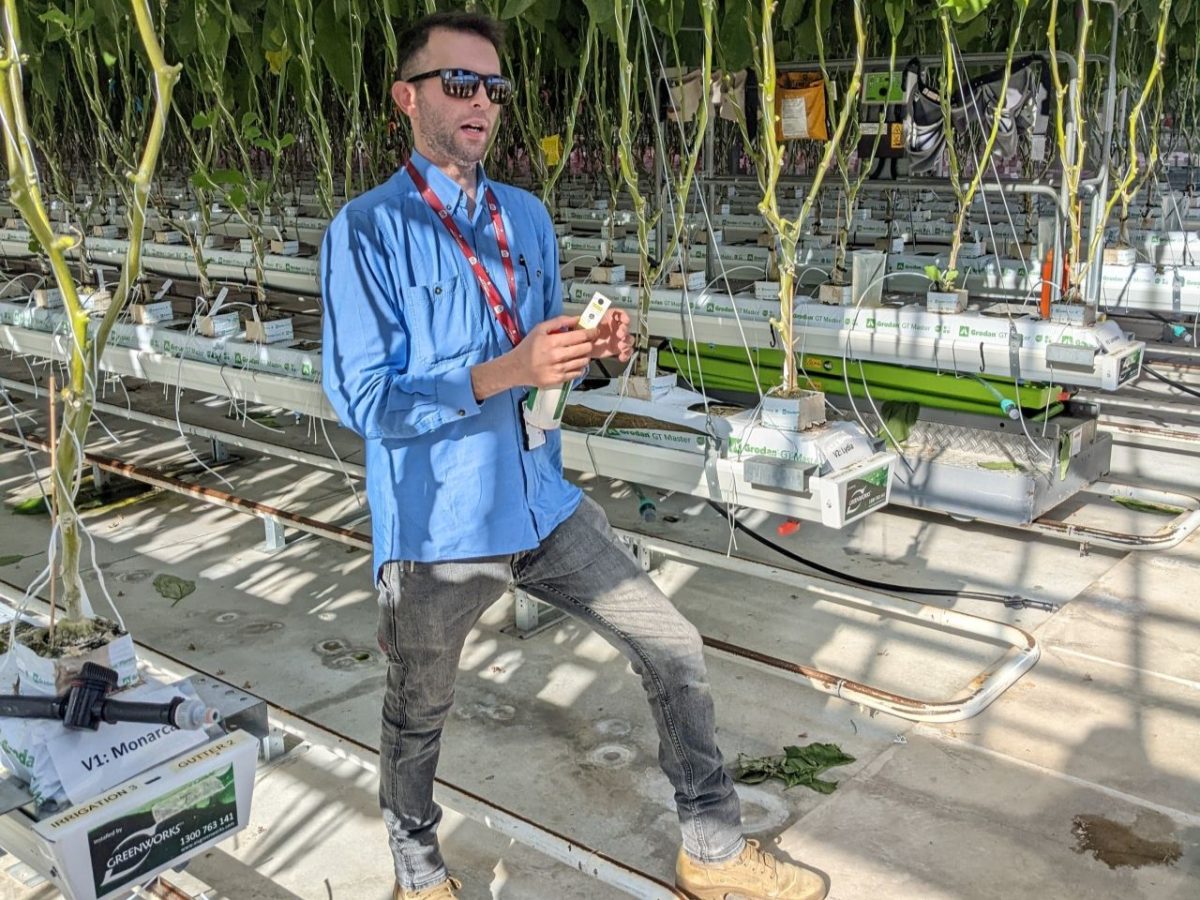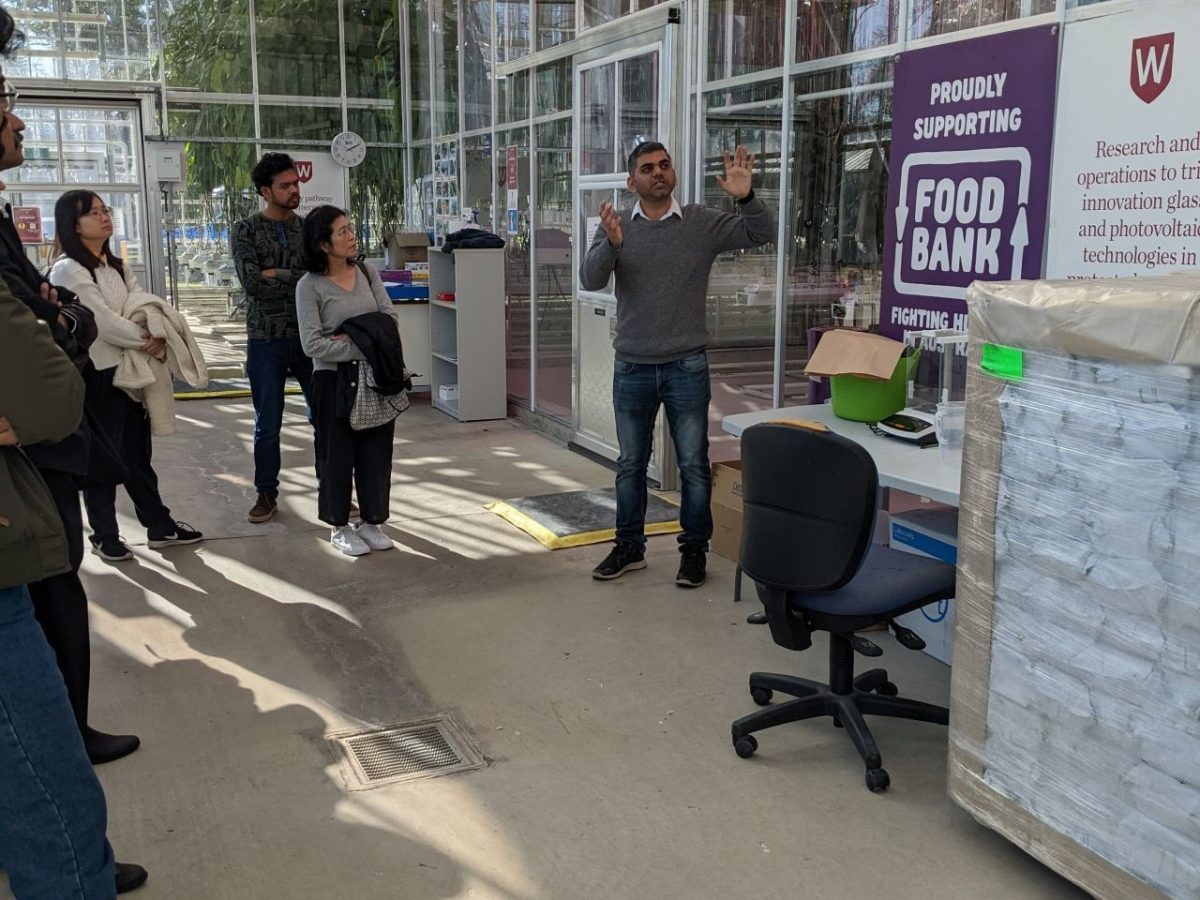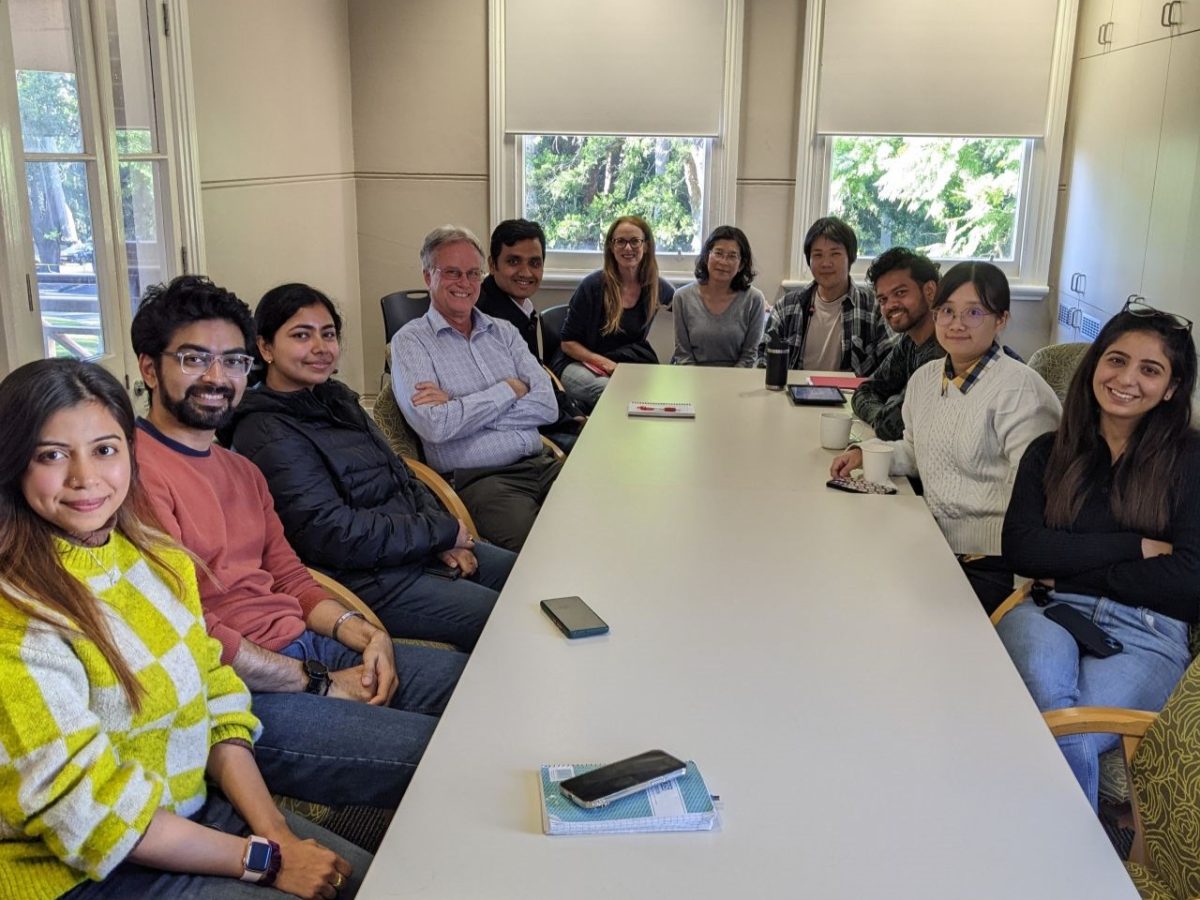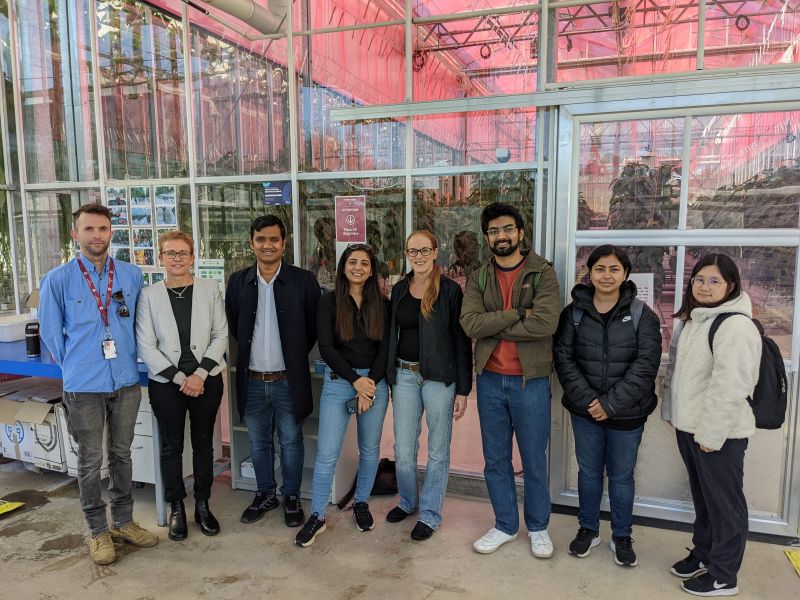On Wednesday 14 June, a convoy of FFS staff and Sydney-based PhDs visited Western Sydney University’s Hawkesbury Institute for the Environment (HIE) and flagship National Vegetable Protected Cropping Centre, around 90 minutes west of Sydney CBD.
The visit was timed to coincide with the second quarterly FFS Students’ Catch-up, at which NVPCC Director, Distinguished Professor David Tissue, was a guest speaker.
Glasshouse tour
The visiting group – including PhDs and post-grads from UNSW, FFS staff and project partner Dr Suzy Rogiers from NSW Department of Primary Industries (DPI) – assembled outside the NVPCC glasshouse. Biosecurity protocols and a safety talk were followed by an informative hour-long guided tour led by NVPCC Facilities Manager Goran Lopaticki.
Goran pointed out some key features of the 18,000-square-metre, semi-automated experimental glasshouse, the site of several ongoing trials – including for FFS projects ‘Glasshouse films’, ‘IoT for indoor cropping’, ‘Sustainable fertigation’ and ‘Automated crop monitoring’, all of which involve FFS-supported PhDs. Postgrad researcher Dr Sachin Chavan then talked about the some of the experiments underway in the glasshouse.
It was a fantastic opportunity for the visiting party to learn more about biosecurity, pollination, climate, automation and growth rates of crops within the NVPCC.

NVPCC Facilities Manager Goran Lopaticki gave the visitors a guided tour of the experimental glasshouse at Western Sydney University’s Hawkesbury Campus. Credit: Future Food Systems
Project presentations
Back at HIE HQ, Distinguished Professor David Tissue; Prof. Oula Ghannoum, Prof. Zhonghua Chen, Dr Chris Cazzonelli and FFS Industry PhD Namal Jayasuriya gave short presentations on their respective FFS projects advancing PC tools and technologies: exploring light-shifting and light-blocking glasshouse films; sensor-based, automated crop monitoring; sustainable fertigation; acoustic pollination; and low-cost IoT networks.
A wide-ranging discussion followed before a stack of pizzas arrived and lunch (and some informal networking) commenced.

Dr Sachin Chavan, R, talked to the FFS visitors about ongoing trials within the NVPCC glasshouse. Credit: Future Food Systems
FFS Student Catch-up
After lunch, the students reassembled in a meeting room nearby to join the rest of the FFS PhD cohort via Zoom from partner universities around Australia. The second quarterly FFS Student Catch-up was hosted by Education & Training Director Prof. Brian Sindel, zooming in from the University of New England in Armidale.
After a welcome from Prof. Sindel and introductions all around – including to some new members of the FFS PhD cohort, Dist. Prof. Tissue gave a brief presentation about industry-led FFS-backed research at HIE; what PhDs can learn from their involvement in collaborative research. He followed it up with some tips on research (ask the right research questions, analyse your data early so you have time to collect more or different data if needed), troubleshooting (seek advice sooner rather than later) and life (take time out occasionally to enjoy it). He then opened the floor to the PhDs for questions and further discussion.
Prior to the catch-up’s close, FFS CEO Dr James Krahe added some words of encouragement to the PhDs, and thanked the students and our hosts at HIE before the visitors headed off to catch buses, trains and shared car-rides back to the Big Smoke.

A group of Sydney-based Future Food Systems’ PhDs Zoomed in to the second quarterly FFS PhD Student Catchup for 2023 from WSU’s Hawkesbury Institute for the Environment. Credit: Future Food Systems
A great day out
“It was great for the PhDs and the FFS team to tour HIE’s impressive glasshouse facility and to see the FFS projects in progress within in,” Dr Krahe said.
“I think everyone gained a lot from the glasshouse experience, and from getting to hear about that research and discuss it with the project leads and PhDs involved.
“The visit was an opportunity for the visiting PhDs to see what the WSU PhDs are working on, but more importantly, a chance to network face to face. Being in the room with so many of our project team members and PhDs reminded us all that we’re part of a bigger mission – and how worthwhile it is to get together in real life and share ideas,” he said.
“Special thanks to David Tissue, Jessica Armstrong-Kearns, Oula Ghannoum, Goran Lopaticki, Sachin Chavan, Zhonghua Chen, Christopher Cazzonelli, Brian Sindel and Suzy Rogiers for providing their time and insights.
“And a huge thanks to our research partner, Western Sydney University, and the team at Hawkesbury Institute for making this a memorable day out west.”
Visiting party
The visiting party included FFS CEO Dr James Krahe, COO Satish Nair, GM Anthony Battaglia, Research Project Coordinator Dr Maria Chandra-Hioe, Communications Manager Merran White and Engagement & Social Media Manager Luke McQuillan, along with NSW DPI’s Suzy Rogiers and UNSW PhD students Rishi Naik, Priyanka Kundu and Kezia ‘Yi-Ya’ Hsu. WSU-based FFS PhD students attending included Sonali Koundal, Namal Jayasuriya, Mazadul Islam, Claudia Vacca and Terry Lin.
More about the NVPCC
The $7 million NVPCC experimental glass, funded jointly by WSU and Hort Innovation, was built according to a design by renowned centre for protected cropping research, Wageningen University in the Netherlands. The 18,000-square metre structure, opened in 2017, includes a large teaching and demonstration room and eight research bays, each 105m2 and enabling precise control of CO2, temperature and humidity, water and nutrients, and aiming to minimise inputs.
https://youtu.be/lTBgA3rbxwU
Lead image: The visitors assembled outside the NVPCC glasshouse on Western Sydney University’s Hawkesbury Campus; L-R: NVPCC Faciities Manager Goran Lopaticki; Dr Jessica Armstrong-Kearns from WSU; FFS Industry PhD Mazadul Islam; FFS Industry PhD and WSU doctoral student Sonali Koundal; FFS Communications Manager Merran White; UNSW doctoral student and FFS scholar Rishi Naik; UNSW Industry PhD Priyanka Kundu; and PhD scholar Kezia ‘Yi Ya’ Hsu, also from UNSW. Credit: Future Food Systems


